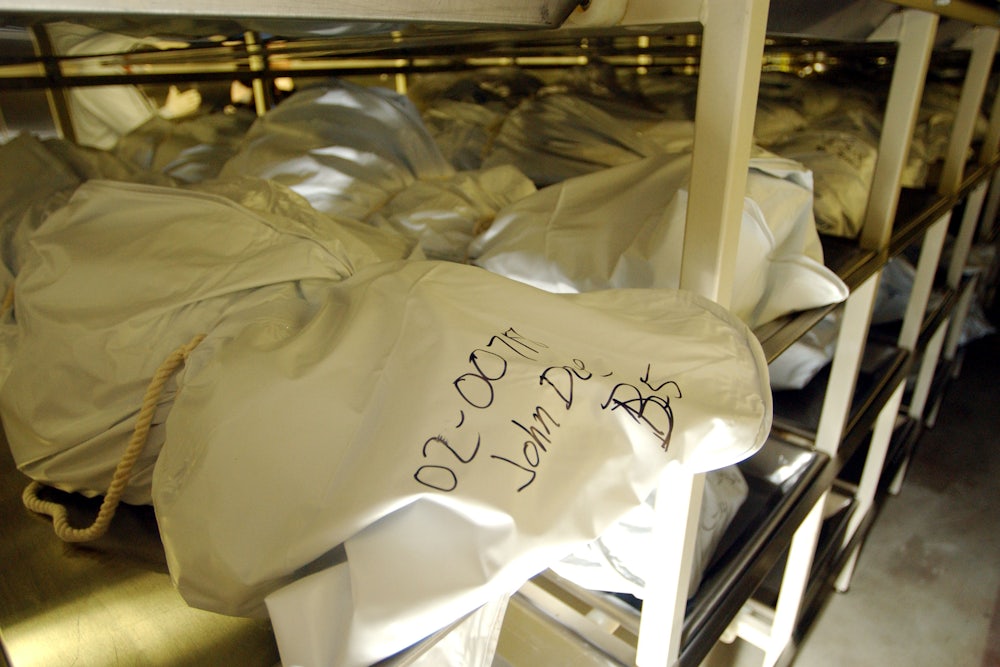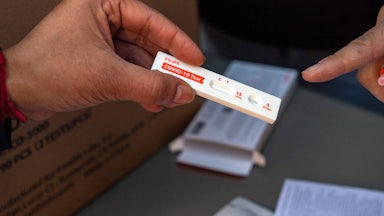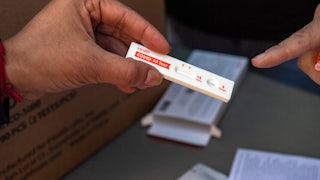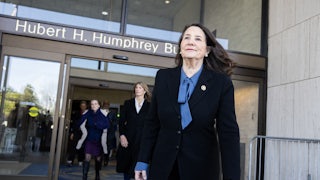Wavis Jordan “doesn’t do Covid deaths.” That’s what the pastor and Republician coroner of Cape Girardeau County, Mississippi, told Missouri Independent last month. He requires families to submit a positive test if they want coronavirus listed on the death certificate. Otherwise, the cause of deaths at home in his county are attributed to a range of other conditions that might be exacerbated by Covid-19, including Alzheimer’s, heart attack, and chronic obstructive pulmonary disease—but never the virus itself.
Jordan isn’t the only death investigator undercounting Covid-19. In Louisiana’s Lafayette Parish, for example, people are currently being pronounced dead over the phone; without enough Covid tests, the county writes down “what the families tell us,” according to a recent USA Today report. In Rankin County, Mississippi, the local coroner told USA Today that many families initially refuse Covid-19 as a cause of death—until they learn about the federal government’s burial reimbursement program. The cut corners add up: In 2020 and 2021, there were one million excess deaths in the United States, but only 800,000 have been attributed to Covid-19 by the coroners and medical examiners on the ground.
These stories may seem shocking. But they’re no surprise to anyone familiar with the American coroner system, a notoriously underfunded, under-regulated, and often unscientific relic of the colonial era—and the crumbling bedrock of modern public health surveillance. The pandemic has simply shown what many public health experts have been arguing for years: The coroner system has got to go.
Historically, coroners have been political appointees or elected officials associated with the criminal justice system. They investigate any death that doesn’t appear natural—a broad category that includes suicides, homicides, and accidents. They may also pitch in with pandemics, natural disasters, and other mass casualty events that overwhelm frontline services. For those who die in a hospital, the majority of death certificates are signed by physicians. But when people begin to die en masse at home, as happened in the early parts of the pandemic, the responsibility falls on coroners and medical examiners. In 2018, the most recent year for which national data is available, more than 1.3 million deaths were referred for further investigation, according to the Bureau of Justice Statistics.
In the last century, the role of coroners and medical examiners has become increasingly important for tracking diseases, researching outcomes of both chronic and infectious diseases and safety issues, and developing effective public health intervention strategies. But unlike medical examiners, who are physicians and, in ideal cases, trained forensic pathologists, the bar for coroners is often much lower. In some states, anyone 18 years or older with no prior felonies may be elected coroner. Once they’re in office, training is patchwork; some jurisdictions require no further education at all.
The coroner system has its roots in medieval England, where coroners protected the interests of the crown, including investigating deaths and collecting taxes. It arrived in the U.S. in the colonial period, where the first coroner election took place in Plymouth County, Massachusetts, in 1636. Today, nearly 80 percent of coroners are elected, and in some jurisdictions, the coroner and the sheriff—or the coroner and the district attorney—are one person. As the country has become more and more polarized, this arrangement has presented clear conflicts of interest. In 2018, for example, the chief forensic pathologist of San Joaquin County, California, quit, alleging that Sheriff-Coroner Steve Moore pressured him to change autopsy findings, including in high-profile deaths involving the police. (While concerning, it also appeared to be legal: In California, the coroner maintains the right to override a forensic pathologist’s determination.)
The shortcomings of the coroner system have long been apparent and the solution equally clear: In 1928, the National Academy of Sciences called for coroner systems to be abolished and all death investigations transferred to trained pathologists. Almost 80 years later, in 2009, the academy once again issued a report arguing the coroner system should be phased out to increase competency and limit influence from political figures or law enforcement. But 14 states maintain a coroner-only system, according to the Centers for Disease Control and Prevention, including Idaho, Arkansas, and Indiana. Fourteen more have a mixed coroner–medical examiner system, including Washington, California, Texas, and New York.
Even medical examiners’ offices face undue burdens, typically the result of poor funding. Today, just 14 percent of coroners’ or medical examiners’ offices are accredited, and even those that are regularly risk losing their status due to underfunding. In 2021, for example, the San Francisco Medical Examiner’s Office finally earned back the accreditation it had lost due to backlog, stolen drugs, and a possibly falsified autopsy report. Now the office proudly reports it is processing 80 percent of cases within 90 days. In the last five years, Massachusetts, Maryland, and Iowa have faced similar inquiries for understaffing, insufficient space for body storage, and more.
The pandemic has shown how essential death-care services are for the larger public health. In March 2020, I spoke with Sally Aiken, a medical examiner in Spokane, Washington, and then the president of the National Association of Medical Examiners. Aiken’s facility is a referral autopsy center, processing the remains of the dead deemed suspicious by coroners in more than a dozen counties throughout Eastern Washington and the neighboring Idaho panhandle. Her offices return a report with their findings—and a bill. “There’s just two of us here, and we have a pretty heavy caseload,” she told me. Staring down the still-nascent Covid-19 pandemic, Aiken knew the burden on her team would only multiply, pushing the handful of qualified experts to their limit.
Accelerating climate change and a predicted increase in zoonotic diseases make ending the patchwork coroner system—and the adequate funding of the medical examiner system that expands to replace it—increasingly urgent. Calculating the true consequences of Covid-19 has been stymied at every turn by the lack of adequate testing; confusion about how the disease spreads; and coroners like Jordan, who refuse to see the virus even when it’s right in front of them. The same will be true for climate change. Natural disasters, from hurricanes to wildfires, already kill and disappear thousands each year, posing a challenge for the fractured forensic system. Other, subtler effects, such as heat waves and especially air pollution, are also overlooked.
No one really likes to think about death, but it comes for everyone. The least we can do is make sure our recounting of what went wrong is accurate. It’s not only a way of respecting the dead. It’s also crucial to protect the living.










